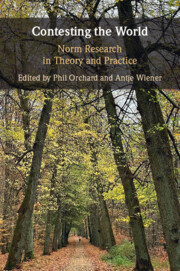Book contents
- Contesting the World
- Contesting the World
- Copyright page
- Contents
- Figures
- Tables
- Contributors
- Acknowledgements
- Abbreviations
- 1 Introduction
- Part I Norm Strength, Collisions, and Conflicts
- 2 Rethinking Norm Change
- 3 Understanding and Resolving Norm Conflict
- 4 Norm Research on Conflictive Norm Relations
- Part II Development of the Field
- Part III Meta-theorising, Linkages, and International Law
- Part IV Dimensions of Norm Contestation
- References
- Index
3 - Understanding and Resolving Norm Conflict
from Part I - Norm Strength, Collisions, and Conflicts
Published online by Cambridge University Press: 01 November 2024
- Contesting the World
- Contesting the World
- Copyright page
- Contents
- Figures
- Tables
- Contributors
- Acknowledgements
- Abbreviations
- 1 Introduction
- Part I Norm Strength, Collisions, and Conflicts
- 2 Rethinking Norm Change
- 3 Understanding and Resolving Norm Conflict
- 4 Norm Research on Conflictive Norm Relations
- Part II Development of the Field
- Part III Meta-theorising, Linkages, and International Law
- Part IV Dimensions of Norm Contestation
- References
- Index
Summary
International Relations theory has dealt extensively with norms and agency in normative environments, including the impact of norms on state behaviour; their diffusion and localisation; and their evolution, contestation, and change. Yet, to date the issue of norm conflict has remained theoretically and empirically understudied in International Relations. We still have little understanding of the judgements that governments or institutions make regarding compliance when the directives inherent in the norms to which they have committed appear to be mutually exclusive. The objective of this chapter is to conceptualise norm conflict as a challenge to decision-making in normative international environments and to outline a theoretical framework for studying and understanding norm conflict, including – most importantly – the ways in which states and international institutions seek to resolve it. In so doing, we draw from International Law and Sociology, two disciplines that have extensively dealt with norm conflict.
- Type
- Chapter
- Information
- Contesting the WorldNorm Research in Theory and Practice, pp. 43 - 63Publisher: Cambridge University PressPrint publication year: 2024

